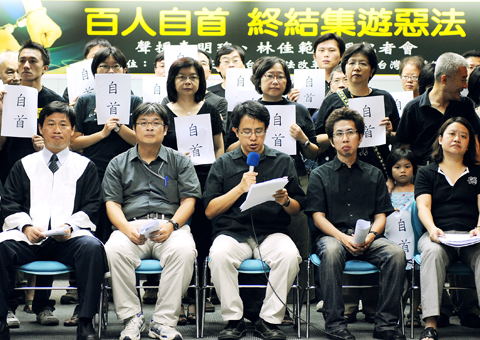More than 120 academics and human rights activists said yesterday they would turn themselves in to prosecutors for breaking the Assembly and Parade Act (集會遊行法) in a protest against the legislation.
One after another, more than 30 people gave their name and occupation at a press conference in Taipei, telling prosecutors that they had violated the Act and would like to turn themselves in.
They did so in a show of support for National Taiwan University (NTU) sociology professor Lee Ming-tsung (李明璁) and Taiwan Association for Human Rights chairman Lin Chia-fan (林佳範), who have been indicted for contravening the Act in May and last month respectively.

PHOTO: LO PEI-DER, TAIPEI TIMES
Lee was indicted for taking a leading role in a student demonstration outside the Executive Yuan last November that demanded a revision of the Act, while Lin was indicted for organizing a separate demonstration outside the legislature.
“We believe that the right to assemble and parade are fundamental rights protected by the Constitution and that peaceful assembly is not an illegal act,” said NTU law professor Yen Chueh-an (顏厥安), whose name topped the “surrender list.”
“We have all taken to the streets without government permission. Therefore, if Lee and Lin are guilty, we’re equally guilty,” he said.
National Tsing Hua University sociology professor Lii Ding-tzann (李丁讚) said he would also turn himself in, even though he didn’t think he had done anything illegal.
“I want to do so because the Assembly and Parade Act is unconstitutional and I want to debate it with a judge and a prosecutor in court,” he said.
He also accused the judiciary of becoming a tool of the executive branch by “threatening people not to speak out and prosecuting people who do.”
More than 50 lawyers joined the campaign by volunteering to provide legal assistance to those on the list.
Meanwhile, the activists and academics also called on the Cabinet and the Chinese Nationalist Party (KMT) to reconsider their version of an amendment to the Act.
Although the Cabinet-proposed revision removes the requirement for organizers to apply for permission before holding a rally, organizers must obtain authorization from the owner of the venue beforehand.
“Since most demonstrations are held in public places, organizers would have to get authorization from the government,” said Liu Ching-yi (劉靜怡), a professor at NTU’s Graduate Institute of National Development.
“So how is that different from applying for a permit?” Liu said.
Liu said she also did not agree with the amendment granting police the power to maintain order and disband demonstrations.
“It makes police both player and referee,” she said.

SECURITY: As China is ‘reshaping’ Hong Kong’s population, Taiwan must raise the eligibility threshold for applications from Hong Kongers, Chiu Chui-cheng said When Hong Kong and Macau citizens apply for residency in Taiwan, it would be under a new category that includes a “national security observation period,” Mainland Affairs Council (MAC) Minister Chiu Chui-cheng (邱垂正) said yesterday. President William Lai (賴清德) on March 13 announced 17 strategies to counter China’s aggression toward Taiwan, including incorporating national security considerations into the review process for residency applications from Hong Kong and Macau citizens. The situation in Hong Kong is constantly changing, Chiu said to media yesterday on the sidelines of the Taipei Technology Run hosted by the Taipei Neihu Technology Park Development Association. With

CARROT AND STICK: While unrelenting in its military threats, China attracted nearly 40,000 Taiwanese to over 400 business events last year Nearly 40,000 Taiwanese last year joined industry events in China, such as conferences and trade fairs, supported by the Chinese government, a study showed yesterday, as Beijing ramps up a charm offensive toward Taipei alongside military pressure. China has long taken a carrot-and-stick approach to Taiwan, threatening it with the prospect of military action while reaching out to those it believes are amenable to Beijing’s point of view. Taiwanese security officials are wary of what they see as Beijing’s influence campaigns to sway public opinion after Taipei and Beijing gradually resumed travel links halted by the COVID-19 pandemic, but the scale of

A US Marine Corps regiment equipped with Naval Strike Missiles (NSM) is set to participate in the upcoming Balikatan 25 exercise in the Luzon Strait, marking the system’s first-ever deployment in the Philippines. US and Philippine officials have separately confirmed that the Navy Marine Expeditionary Ship Interdiction System (NMESIS) — the mobile launch platform for the Naval Strike Missile — would take part in the joint exercise. The missiles are being deployed to “a strategic first island chain chokepoint” in the waters between Taiwan proper and the Philippines, US-based Naval News reported. “The Luzon Strait and Bashi Channel represent a critical access

Pope Francis is be laid to rest on Saturday after lying in state for three days in St Peter’s Basilica, where the faithful are expected to flock to pay their respects to history’s first Latin American pontiff. The cardinals met yesterday in the Vatican’s synod hall to chart the next steps before a conclave begins to choose Francis’ successor, as condolences poured in from around the world. According to current norms, the conclave must begin between May 5 and 10. The cardinals set the funeral for Saturday at 10am in St Peter’s Square, to be celebrated by the dean of the College